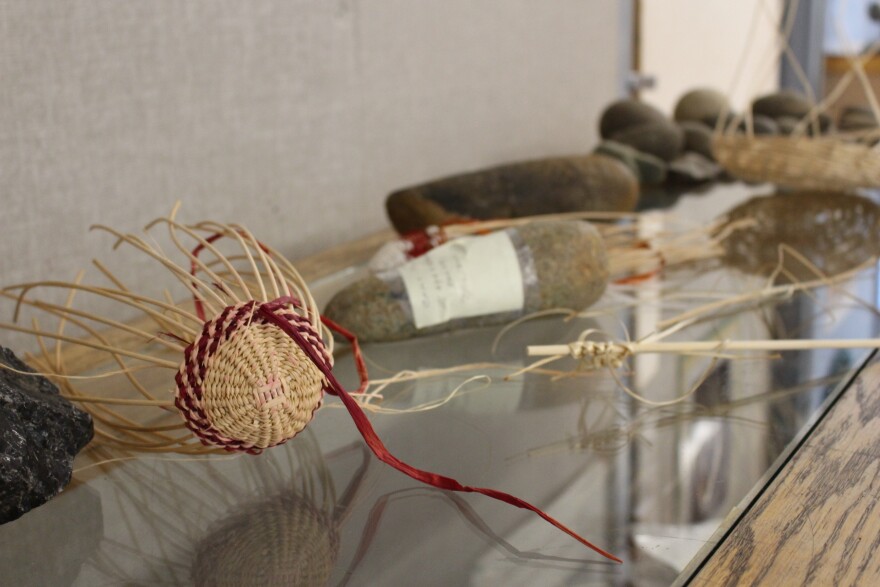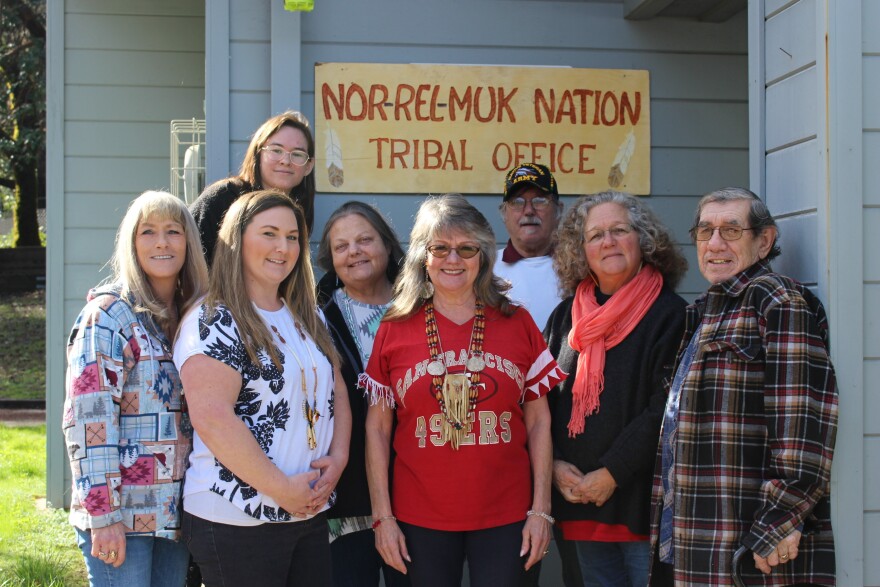This year, the Nor Rel Muk Wintu Nation will be celebrating the reclamation of 78 acres of their ancestral lands through an anonymous donation.
The donor told the tribe the gift was inspired by the global Land Back movement, which has made significant gains in California in the last year alone.
Tribal Chairperson John “Sonny” Hayward said having land means the tribe has something to build on and carry into the future.
“It's a great feeling,” Hayward said, “a great, great feeling.”
A tribe of just under a thousand people, the Nor Rel Muk Wintu are traditionally based in the Hayfork area in rural Trinity County. Though a few hundred members still live in the area, according to tribal council secretary Cyndie Childress, others are scattered across the North State and even farther.
That’s because for a century and a half, the Nor Rel Muk Wintu were essentially landless, a result of state-sponsored genocide.
In the same year that settlers from Weaverville killed hundreds of Nor Rel Muk Wintu people in the Land Bridge Massacre (also called the Natural Bridge Massacre) the tribe signed a treaty with the United States government that entitled it to a 35-acre reservation. But the treaty went unratified and, like many Native American tribes across the nation, the Nor Rel Muk Wintu saw the right to live in their ancestral lands dwindle in the face of colonization.
Now, the land has started to come back. In 2021, the Nor Rel Muk Wintu bought an old school building from the county to conduct council meetings in, though the land it sits on must be leased from the U.S. Forest Service.
Then, in the last days of 2023, the 78-acre anonymous land donation was finalized, replete with solar panels, a house, an orchard and garden beds.

Hayward said his people have come far in just the last few years.
“I'm going to have to step down pretty soon. And so when I leave, I can look back and say, ‘Hey, they got something for a change. They got a hold of something that this tribe has never had,” Hayward said.
A place to gather
Plans for the land include restoring native plant species for medicinal and culinary purposes, practicing hunting and fishing, managing and restoring the wildfire-impacted forest, holding summer camps for children, hosting cultural education opportunities, and gathering for ceremonies.
Hayward said eventually, the tribe might be able to build homes for its elders. He added that he hopes having land to gather on can increase the membership of the tribe.
Already, some tribal members who have moved out of the area say the land back news makes them want to return.
Nor Rel Muk Wintu alternate council member Tresha Lynn Dodson lives in Long Beach, Washington. She said her family’s goal in the next few years is to move back to be closer to the tribe.
“I know for my peace of mind and future, that's where I need to be. My soul is gravitated back to our ancestral lands,” Dodson said.

A return to the land
Tracy Foster-Olstad, cultural resource officer for the tribe, said she feels like the land is finally coming home to her family.
Foster-Olstad’s grandmother used to live somewhere on or near the newly returned property. She says her grandmother crossed the Trinity River to go to school at the exact spot on the river bank that Foster-Olstad visited weeks after the land back gift was finalized.
And Foster-Olstad always remembered her grandmother saying she left behind a beloved doll when the family moved away.
“I know the doll won't be there, but the porcelain face may be there somewhere,” Foster-Olstad said. “And that would just be a lifelong dream to find that porcelain head of her little doll out there somewhere.”
Foster-Olstad and others in the tribe were cut off from their heritage because of anti-Native prejudice and assimilationist policies. She hopes this land will help the Nor Rel Muk Wintu people reconnect with their culture and the spirits of their ancestors.
In that vein, some — like Tresha Lynn Dodson — hope to see the site of the Land Bridge Massacre returned next, to be honored and managed by the tribe.

#LandBack in California
Attorney and legal scholar Elaina Rae Erola said the Land Back movement that inspired this gift has seen significant victories in California, but more needs to be done.
She said the process of receiving land is still too lengthy and complicated. While the gift to the Nor Rel Muk Wintu Nation took around eight months to finalize, other California tribes have negotiated land purchases and transfers for decades, Erola said, sometimes employing the help of multiple law firms and nonprofits.
Erola said that shouldn’t be the case.
“If it's so easy for people to just inherit land, why is it not so easy for tribes to just take back their original land?” Erola said.
While researching the topic for an article she wrote last fall, Erola found recent victories for the Land Back movement in California and the West have overwhelmingly come from private entities. She argues the federal government should be facilitating these returns instead.
The fight for federal recognition
Vanessa Esquivido-Hernandez is an enrolled member of the Nor Rel Muk Wintu Nation who wrote her 2019 dissertation at U.C. Davis on her tribe’s fight for federal recognition, deeming it the “number one goal” of the tribe since the 1980s.
“We literally petitioned [for recognition] a year before I was born,” she said.
She said she believes the donation will help them achieve that goal.
“This land back has really put a pulse, put a vibration out, of energy that reawakens many of us to continue that fight,” Esquivido-Hernandez said.
Because they don’t have federal recognition, the Nor Rel Muk Wintu will have to pay taxes on the 78 acres of gifted land.
Its sovereignty is curtailed in other ways too. Tribes without federal recognition cannot create their own clinics, housing, or educational opportunities.

Donna Landry-Rehling is the recording secretary and parliamentarian for the Nor Rel Muk Wintu council and advocates for federal recognition for the tribe. She said recognition would change the tribe’s economic future.
“The difference is night and day with economic development for the tribes that are federally recognized,” Landry-Rehling said.
She said she feels optimistic about a bill introduced last year that would help the tribe bypass the petition process it’s spent four decades on and gain recognition through the legislature instead. But that bill has been stalled for months due to turmoil in Congress.
For Esquivido-Hernandez, not having federal recognition meant losing out on scholarships and benefits like healthcare. It also meant making the hard decision to enroll her daughter in her partner’s federally recognized tribe instead of the Nor Rel Muk Wintu.
“But what that did is, (it) stopped our line at the Nor Rel Muk,” she said.
Esquivido-Hernandez said her tribe now owning this land is a defiant gesture to the federal government. She’s often felt the tribe has been overlooked or pushed aside. Having land could change that.
“It gives us hope. It gives us the opportunity to see what this can be as our ancestors experienced it,” she said.
“This is a huge piece for our sovereignty. This will really allow us to be who we are on this land.”
Esquivido-Hernandez is planning for her daughter’s flower dance — a coming-of-age ceremony — to take place on the returned land. It’s a sign to her, her family, and her tribe that the Nor Rel Muk Wintu will go on, gathering together “for eternity” on their own land, with or without federal recognition.



